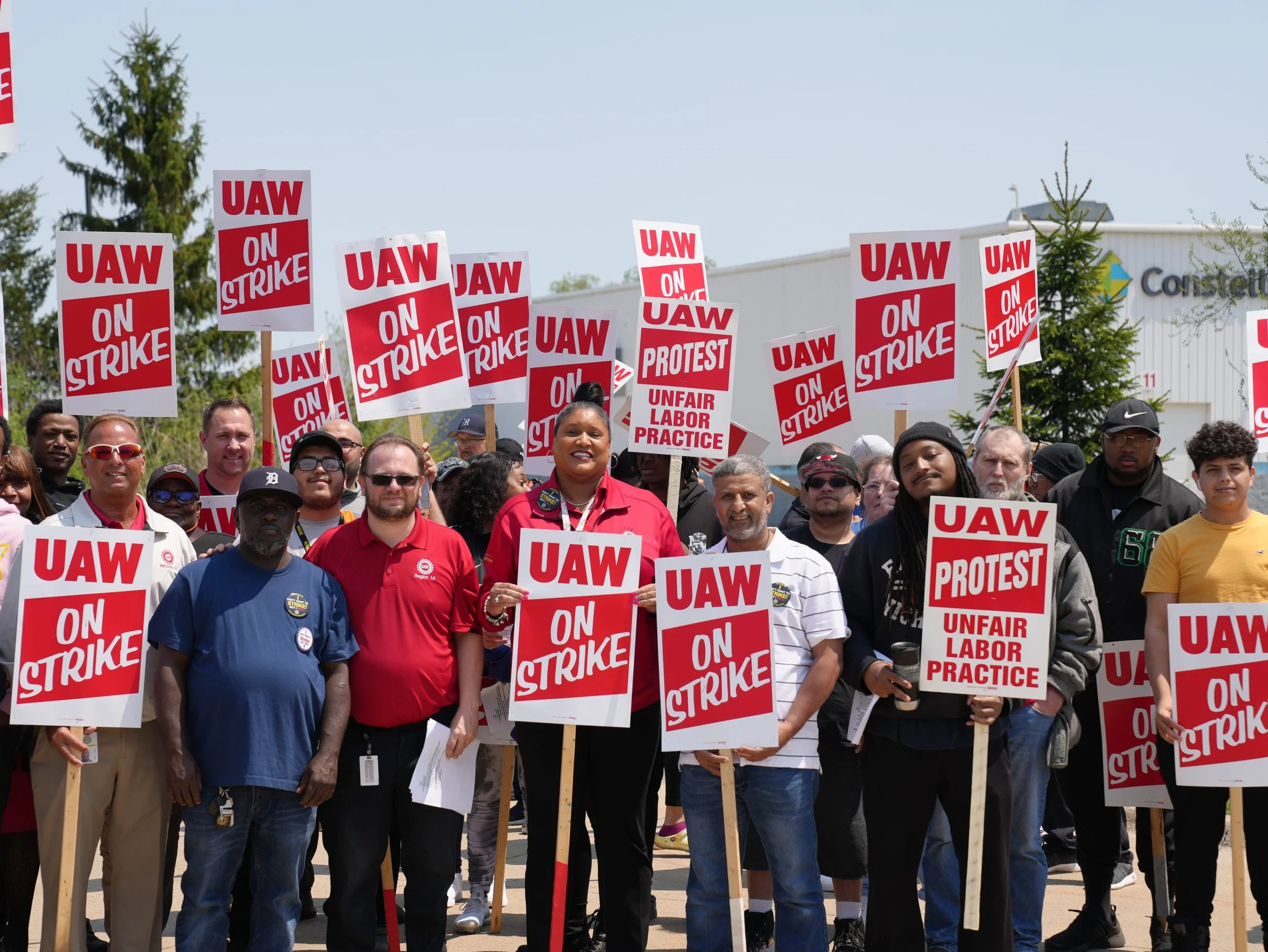Continue Reading
Biggest Finance Newsletter for Women
Join 200,000 other people interested in money, power, culture, and class.
Subscribe

Constellium Automotive workers in Van Buren Charter Township, Michigan, striking back in May after Ford refused to “bargain in good faith.” (Credit: UAW.org .)
I’ve been creating content about money, the economy, and the state of work on and off for five years, and I’ve sensed a definitive shift in sentiment over the last 18 months.
I see it most in the changing responses to Money with Katie video content online; purely tactical pieces that used to elicit little more than sterile clarifying questions are now met with (justifiably angry) responses from people who feel as though “personal finance advice” is a ridiculous solution to the financial issues they’re facing. “How does this not outrage you?” one commenter asked recently when we shared a dystopian headline from the Wall Street Journal about the secret to saving for retirement (hint: Begin when you’re a teenager!).
In short: The baseline state of most people today who labor for income is (a) burnt out and (b) pissed off, and it feels like we’re on the precipice of change.
But calls for collective action in the US (save for an anomalous period after WWII) have long been diluted by the strong American ethos for individual solutions—the idea that you can good-decision your way out of bad situations (I’m including my own “individual solutions” in this criticism). In this paradigm, making choices that improve your own situation but undermine that of the whole are excusable, understandable. You gotta do what you gotta do.
Perhaps that’s why this year’s news coverage of collective action has felt so different than in years past:
Americans’ approval of labor unions is at its highest level since 1965: 71% of people surveyed support the concept. The actors’ and writer’s strike has been going strong since May, and celebrities like Drew Barrymore—who posted a teary-eyed video explaining her decision to bring back her show despite the strike, then walked it back in another teary-eyed video—have been criticized in comments sections the world over for breaking solidarity.
United Auto Workers recently made headlines for beginning its own strike for shorter working hours (down from 40-hour weeks to 32, but for the same pay), a demand at which automakers scoffed. Executive messaging points in the media circus that followed ultimately amounted to asking the public, “Can you believe this shit?”
Turns out, yes—yes, we can.
Because unfortunately for the automakers, the internet is run by young people, and most young people aren’t quick to sympathize with the C-suite. Zoomers’ (and millennials’, to some extent) entire generational identity is built around being economically disenfranchised, so it’s probably no surprise that the automakers’ pleas to “come to the table in good faith” for meager pay bumps are being rebuffed online. (The related interviews circulating of the CEOs trying to justify their $30 million/year compensation packages are capitalist camp.) The average American sees herself in the striking workers, not in Mary Barra.
Over the weekend, I scrolled past a video of South Carolina GOP Senator and presidential candidate Tim Scott discussing the strike. “They want more pay for fewer days on the job,” he lamented, “There’s a disconnect. We have to find a way to encourage people to go back to work.” Many replies were quick to point out that senators—like Scott—work just three days per week. “We literally all want that,” another commenter wrote. And they’re right! The only disconnect here, it seems, is between Scott and the people he’s campaigning to represent.
Only 16% of households in the US contain a unionized member, but despite their relatively low numbers, I think unions have come to symbolize a sort of antihero fighting against American individualism more broadly. I can’t remember the last time there was this much coverage, conversation, and support surrounding a fight for better pay and working conditions. It’s almost as though the majority of households feel the “declining labor share of income” these groups are fighting against, despite not being unionized themselves.
And I’m less interested in the finances of Ford, GM, or major production houses and streaming services, or whether all of the unions’ demands are reasonable. I’m more intrigued by what this cultural focus on labor unions as a positive force fighting for change might signal about the future.
After all, strikes are designed to cause pain in the industries they affect. They’re supposed to put pressure on supply chains, disrupt the flow of income, and make things uncomfortable enough that something has to change. Through the individualist lens of American culture, you’d think the car-buying, TV-watching public would want things like auto workers’ and writers’ strikes to end as quickly as possible. Get back to those factories and manufacture our functional third-row Suburbans, people! #Merica
But the general public response seems decidedly supportive. And I can’t help but feel as though it’s a sign we’re careening toward the inevitable breaking point: Most everyone I speak with thanks to my work (primarily college-educated, white-collar workers earning above-median incomes) feels it—this inability to continue business as usual.
For some, it’s a pay thing; they feel as though they’re working too hard (or too many hours) for their current compensation, or that no matter what they do, they can’t seem to get their income to outpace the cost of living.
Others are satisfied with their compensation but feel as though they’re stuck on a hamster wheel they can’t jump off without seriously hurting their career or financial prospects (because once you’ve reached the upper middle class, your whole life becomes an exercise in preventing a backslide).
It’s easy to write these off as #YuppieProblems—particularly in light of the type of manufacturing work at the center of the UAW strike—but I think the fact that these feelings of unsustainability transcend socioeconomic classes and industry sectors highlights how widespread the issue is, and why the spirit of these strikes has captured our attention in 2023.
Because the SAG-AFTRA and UAW strikes correctly identify the issue at the core of most worker grievances: The superiority of the shareholder (rather than the employee or the customer) means labor’s share of the pie will continue shrinking…until labor pushes back (incomes for the top 10% have risen in reverse correlation with union participation shrinking since the 1970s).
The obvious reason for this reverse correlation? The individual worker has very little bargaining power when going toe-to-toe with a huge corporation. But the entire workforce? Well, the corporation can’t function without them. Collective bargaining can create more equal leverage on both sides of the table.
It’s a fight against the desire for infinite growth (across the personal, corporate, stock price, and national levels); a rejection of the idea that endless growth should be the goal. As Amit Kapoor and Bibek Debroy wrote in the Harvard Business Review, “GDP is not a measure of human well-being.”
It seems to me that little by little, more Americans are coming around to this realization: If we don’t have our well-being, what’s the point?
On a personal note, this week’s content comes at an interesting time: I’m sick for the second time this year, run down from making the foolish mistake of trying to maintain a social life while also working constantly, and reevaluating my own relationship with both. In a related vein, our episode of The Money with Katie Show this week is about the power of a sabbatical, and why it might be the smartest thing you could do for your career and personal life.
As I sit here, sniffling through DayQuil drowsiness and rocking back and forth in the same sweaty pajamas I’ve been wearing for three days, my mind is not focused on whether or not I’m making it worse by writing this blog post—it’s worrying about the quality of the blog post; concerned that my upper respiratory infection brain fog might be degrading the astuteness of the observations.
It’s me. Hi! I’m the problem, it’s me.
Maybe my ability to see the turning point clearly, agree with its grievances, and still fail to embrace an attitude of “well-being > work” (witness me upright at my computer instead of lying prone in a dark room) is the biggest hallmark of this cultural moment, emphasizing why things like solidarity and collective action are so important. Because left to our own devices, we’ll probably default to the status quo.
September 25, 2023
Looking for something?
Search all how-to, essays, and podcast episodes.
Explore
While I love diving into investing- and tax law-related data, I am not a financial professional. This is not financial advice, investing advice, or tax advice. The information on this website is for informational and recreational purposes only. Investment products discussed (ETFs, index funds, etc.) are for illustrative purposes only. It is not a recommendation to buy, sell, or otherwise transact in any of the products mentioned. Do your own due diligence. Past performance does not guarantee future returns.
Money with Katie, LLC.
Terms & Conditions | Privacy Policy
This Site Was Built by Brand Good Time



